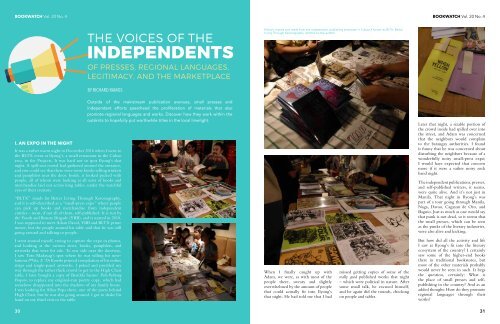MESSAGE FROM THE CHAIR
bookwatch-vol.20-no.4-WEB
bookwatch-vol.20-no.4-WEB
Create successful ePaper yourself
Turn your PDF publications into a flip-book with our unique Google optimized e-Paper software.
BOOKWATCH Vol. 20 No. 4 BOOKWATCH Vol. 20 No. 4<br />
<strong>THE</strong> VOICES OF <strong>THE</strong><br />
INDEPENDENTS<br />
Eclectic scenes and reads from the independent publishing showcase in Cubao X known as BLTX: Better<br />
Living Through Xeroxography. (photos by the author)<br />
OF PRESSES, REGIONAL LANGUAGES,<br />
LEGITIMACY, AND <strong>THE</strong> MARKETPLACE<br />
BY RICHARD RAMOS<br />
Outside of the mainstream publication avenues, small presses and<br />
independent efforts spearhead the proliferation of materials that also<br />
promote regional languages and works. Discover how they work within the<br />
outskirts to hopefully put worthwhile titles in the local limelight.<br />
I. AN EXPO IN <strong>THE</strong> NIGHT<br />
It was a rather warm night in December 2016 when I went to<br />
the BLTX event at Ilyong’s, a small restaurant in the Cubao<br />
area, in the Projects. It was hard not to spot Ilyong’s that<br />
night. A spill-out crowd had gathered around the entrance,<br />
and you could see that there were some kiosks selling trinkets<br />
and pamphlets near the door. Inside, it looked packed with<br />
people, all of whom were looking at all sorts of books and<br />
merchandise laid out across long tables, under the watchful<br />
eyes of their creators.<br />
“BLTX” stands for Better Living Through Xeroxography,<br />
and it is self-described as a “small-press expo” where people<br />
can pick up books and merchandise from independent<br />
entities – most, if not all of them, self-published. It is run by<br />
the Youth and Beauty Brigade (YBB), and it started in 2010.<br />
I was supposed to meet Adam David, YBB and BLTX prime<br />
mover, but the people around his table said that he was still<br />
going around and talking to people.<br />
Later that night, a sizable portion of<br />
the crowd inside had spilled over into<br />
the street, and Adam was concerned<br />
that the neighbors would complain<br />
to the barangay authorities. I found<br />
it funny that he was concerned about<br />
disturbing the neighbors because of a<br />
wonderfully noisy small-press expo;<br />
I would have expected that concern<br />
more if it were a rather noisy rock<br />
band night.<br />
The independent publications, presses,<br />
and self-published writers, it seems,<br />
were quite alive. And it’s not just in<br />
Manila. That night in Ilyong’s was<br />
part of a tour going through Manila,<br />
Naga, Davao, Cagayan de Oro, and<br />
Baguio. Just as much as one would say<br />
that punk is not dead, so it seems that<br />
the small presses, which can be seen<br />
as the punks of the literary industries,<br />
were also alive and kicking.<br />
I went around myself, trying to capture the expo in photos,<br />
and looking at the various zines, books, pamphlets, and<br />
artworks that were for sale. To one side near the doorway,<br />
I saw Toto Madayag’s spot where he was selling his nowfamous<br />
P*cha, E ‘Di Komiks printed compilation of his online<br />
strips and single-panel artworks. I poked and prodded my<br />
way through the rather thick crowd to get to the High Chair<br />
table; I later bought a copy of Benilda Santos’ Pali-Palitong<br />
Posporo, to replace my original-run poetry copy, which had<br />
somehow disappeared into the shadows of my family house.<br />
I was looking for Allan Popa there, one of the poets behind<br />
High Chair, but he was also going around. I got to shake his<br />
hand on my third visit to the table.<br />
When I finally caught up with<br />
Adam, we were, as with most of the<br />
people there, sweaty and slightly<br />
overwhelmed by the amount of people<br />
that could actually fit into Ilyong’s<br />
that night. He had told me that I had<br />
missed getting copies of some of the<br />
really good published works that night<br />
– which were political in nature. After<br />
some small talk, he excused himself,<br />
and he again did the rounds, checking<br />
on people and tables.<br />
But how did all the activity and life<br />
I saw at Ilyong’s fit into the literary<br />
ecosystem of the country? I certainly<br />
saw some of the higher-end books<br />
there in traditional bookstores, but<br />
most of the other materials probably<br />
would never be seen in such. It begs<br />
the question, certainly: What is<br />
the place of small presses and selfpublishing<br />
in the country? And as an<br />
added thought: How do they promote<br />
regional languages through their<br />
works?<br />
30 31


